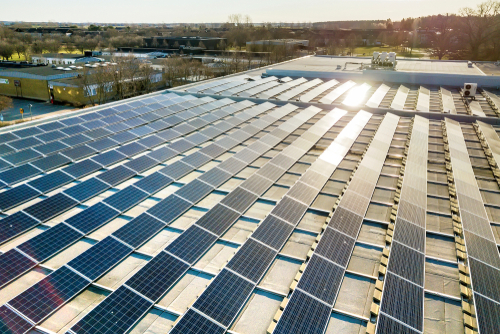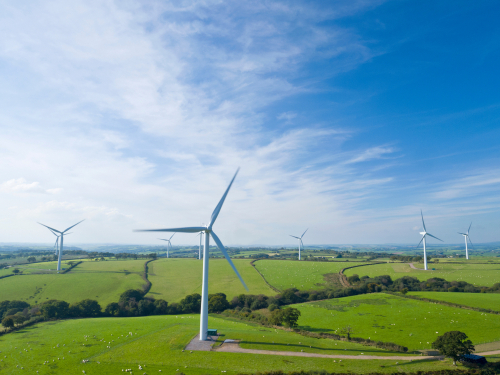Power Purchase Agreements
The Pathway to Significant Savings for UK Companies.

Introduction To Power Purchase Agreements
In today's volatile energy market, where prices fluctuate unpredictably, many UK businesses are turning to Power Purchase Agreements (PPAs) to secure long-term, stable energy costs.
PPAs are vital in helping companies achieve significant savings while supporting their sustainability goals. But what exactly is a PPA, and why are they gaining traction among large corporations?
What is a Power Purchase Agreement?
A Power Purchase Agreement (PPA) is a long-term contract between a business and an energy provider, typically spanning 10 to 25 years.
Under a PPA, the provider agrees to supply energy at a fixed or predictable price, generated from renewable sources such as solar, wind, or biomass.
The key appeal of a PPA is its ability to hedge against rising energy costs by locking in prices, providing businesses with financial predictability and protection against market volatility.
The Clear Benefits of PPAs
- Cost Savings: One of the most compelling reasons for companies to consider a PPA is the potential for substantial cost savings. By securing a fixed energy price, businesses can often achieve savings of up to 42% on their energy bills compared to traditional energy procurement methods. This financial predictability is especially valuable in a market where energy prices are prone to sudden increases.
- Sustainability: With increasing pressure to reduce carbon footprints, PPAs offer a direct way for companies to align their energy consumption with their sustainability goals. By sourcing energy from renewable sources, businesses can significantly reduce their greenhouse gas emissions, contributing to a cleaner environment.
- Energy Security: PPAs provide a reliable and consistent energy supply, reducing the risk of energy shortages or price spikes. This security is crucial for businesses that rely on uninterrupted energy supply to maintain operations.
- Reputation and Brand Value: Companies that commit to renewable energy through PPAs can enhance their brand reputation, demonstrating their commitment to sustainability and corporate social responsibility. This can lead to increased customer loyalty and a stronger market position.
The Term of a PPA
The term of a PPA typically ranges from 10 to 25 years.
This long-term commitment ensures price stability over an extended period, allowing businesses to plan their budgets more accurately.
However, the length of the contract can vary depending on the business's specific needs and the energy provider's offer.
Why Might Companies Hesitate to Adopt a PPA?
Despite the clear benefits, some companies may hesitate to enter into a PPA.
Here are a few common reasons:
- Long-Term Commitment: The lengthy contract term of a PPA can be daunting for businesses that are uncertain about their long-term energy needs or are wary of being locked into a long-term agreement.
- Complexity: The legal and financial intricacies of a PPA can be complex, requiring expertise in contract negotiation and energy markets. Businesses without this expertise may find the process challenging.
- Market Perception: Some companies may worry that committing to a PPA could be considered risky if energy prices were to fall below the agreed rate in the future.
Common Questions on PPAs
- "What if energy prices drop?": While energy prices could decrease in the short term, the long-term trend has been upward. A PPA mitigates the risk of future price hikes, providing financial predictability that outweighs the potential for short-term savings.
- "We're not sure about the long-term commitment.": A well-structured PPA offers flexibility, with options to renegotiate or exit under specific conditions. Businesses can also tailor the term length to their needs, ensuring it aligns with their strategic goals.
- "It's too complex for us.": Partnering with a knowledgeable PPA provider or consultant can simplify the process. These experts can guide businesses through the complexities, ensuring they maximize the benefits of the agreement.
Conclusion
Power Purchase Agreements are proving to be a game-changer for UK companies, offering a pathway to significant cost savings, energy security, and enhanced sustainability.
While there may be hesitations and objections, the long-term benefits of a PPA often far outweigh the perceived risks.
For businesses looking to future-proof their energy procurement, a PPA could be the strategic advantage needed to thrive in an increasingly competitive market.
More Blogs
.svg)
Your Questions Answered

With a PPA (Power Purchase Agreement), you pay nothing upfront — the system is funded by a third party, and you buy the energy at a fixed, discounted rate. With Capex, you invest in the system yourself and keep 100% of the savings. We’ll help you compare both and find what’s best for your business.

Yes — and it’s one of the most common cases we support. We offer 100% REGO-backed green tariffs and CPPAs that don’t require solar installation or landlord involvement.

We work on a fully transparent fee structure, either through a disclosed uplift, flat fee, or success-based model. You’ll always know what we earn — and we aim to erase our cost within 6–12 months through price optimisation or generator sourcing.

A green tariff is grid electricity matched with REGO certificates from renewable generators.A CPPA is a long-term direct agreement with a specific wind or solar farm. CPPAs offer price certainty and traceability, while tariffs are short-term and flexible.

Yes. If you own the system (via Capex), we can help you sell your surplus back into the grid — or into our private energy market for better rates.
Still have questions? We're here to help! Whether you're curious about installation, costs, or how solar works, our team is ready to guide
Talk to an expert about your strategy.
.jpg)





.jpg)